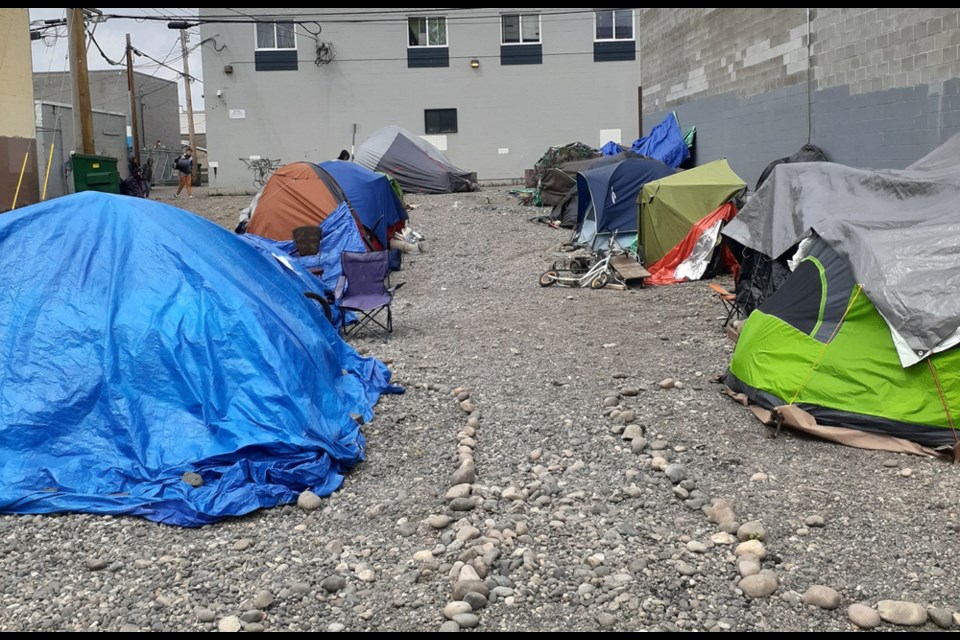The opioid crisis, mental health issues and homelessness aren’t just
“This is a very complex issue,” Hall said. “I’ve had numerous conversations with non-profit organizations, organizations that provide housing, and across the spectrum. This city has been partnered with Northern Health, BC Housing, the Ministry of Housing, talking about our integrated health model on First Avenue .”
Last week, before the rallies were even held in the downtown core of
There are a number of things that are taking place the city has been involved with on some level, he added, including the Elizabeth Fry housing project on 15th Avenue and the Aboriginal Housing project at 17th and Massey that will provide homes for so many.
“We’re constantly in contact with non-profit organizations about the homeless issue, opioid crisis, addiction and mental illness issues and how we can pull groups together and become a partnership and I think the integrated health model on
Northern Health and BC Housing are working non-stop on these issues, Hall said.
“I talk quite a bit about the realm of responsibility when it comes to what the city can do and that’s why we create these partnerships with NHA (Northern Health Authority) and with BC Housing. BC Housing has done a great job from a shelter perspective, to low barrier housing to provide for folks. It’s just about collaboration, partnerships and finding solutions that work.”
Hall has some serious reservations about a tent city, he added.
“You can put a solution in place that may last six or eight months or a year and then you have to reconfigure that solution,” he said. “I’m on the phone constantly with mayors in other cities talking about best practices and what they’re doing for their marginalized citizens and that’s exactly what we’re talking about - folks that are on the streets - folks with mental health issues or opioid addictions - so we’re going to continue to do that.”
When it comes to a tent city, Hall said he’s looked at other communities and it’s a complex issue on its own.
“We’ve seen what tent cities have become in other communities throughout the province so if we’re talking about a tent city - let me talk to the organizers, what are you thinking about it?” Hall asked. “I have some concerns about it, there’s no question. But I think it’s a conversation that has to happen.”
Hall knows there are accommodations in shelters and other BC Housing facilities but understands the homeless people living on the streets are still a presence in the community.
“There isn’t a day that goes by that we as a staff or I don’t deal in some form or fashion with the social issue - if I can put it under that umbrella - not just in our downtown but throughout our community. We’ve seen campers in many of our parks.”
When it comes to managing the homeless people it involves bylaw services, the RCMP and the city park staff, Hall added.
“The concerns I have around a tent city is what it starts out to be and what it then ends up being. What is that middle ground? I have safety concerns, security concerns, and those are two of the more specific concerns that I have. We’ve seen that in other communities where tent cities have been established and it’s that public safety and health and I can’t stress strongly enough the security of it.”
The complexities of the situation change daily, he added.
“The city can’t do this alone,” Hall said. “It’s those partnerships that we create probably more on a provincial level like the Ministry of Housing, BC Housing, health authorities throughout the province, I would say that there are other ministries that we deal with that provide assistance for us and guidance when it comes to dealing with the addiction issue - I won’t call it an issue - I will call the opioid addiction a crisis - and the mental illness issues that are facing us and there are a multitude of ministries that need to be drawn into this conversation - probably three or four - and I am a firm believer that housing is a first approach and I will take it one step further - if we’re going to provide housing it’s important to provide services.”
Hall said he’s not a professional in the field so he depends on the Ministry of Health and professionals in the field to give some guidance as to what those services look like and what is required.
“It’s a proven fact that housing first is certainly the first option and I just add the service piece to it,” Hall said. “And that’s what the integrated health model will provide on



